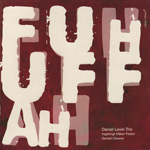|
|
 |
Dusted Reviews
Artist: Daniel Levin Trio Album: Fuhuffah Label: Clean Feed Review date: Feb. 3, 2009 |

|
|
|
 |
A lot of improvised music nowadays gains creative sustenance from the determination to challenge the boundaries of form and technique. Cellist Daniel Levin’s three previous recordings have harnessed these impulses, particularly by employing the poly-stylistic radical trumpeter Nate Wooley to expand what is basically an acoustic chamber quartet into quasi-electronic territory, but also by playing small group jazz without conventional rhythmic accompaniment. On this record he works with the relatively conventional trio with Ingebrigt Håker Flaten (The Thing, Atomic, School Days, Scorch Trio) on bass and Gerald Cleaver (Roscoe Mitchell, Matthew Shipp) on drums, and much of the time the music adheres more closely to a leader-over-rhythm section dynamic.
But the changes are a matter of degree, not kind. While the quartet might have sounded like it was swinging while one player melted metal in a cauldron, it still swung as vigorously as the trio does on “Metaphor.” And just as the quartet embraced the inevitable label of chamber jazz (can any band with a cello escape it?) by playing intricate music full of nuanced interaction, the trio does something similar with their play of shading and overtones on the twin-bow excursion “Woods.” So while the sounds and roles Levin works with here are a bit more conventional, the biggest differences between the groups lay more in the sounds themselves and the personalities of the players.
The action between two strings, especially when they’re both playing pizzicato, gives a sharper, more spiky feel to the trio’s music than did the blend of vibraphones and trumpet tones in the quartet. Cleaver’s drums likewise fill up the aural spectrum quite differently than do those instruments, with definition and shifting surfaces instead of melding tones, and he also fosters a more emphatic kinetic sense. And Flaten is a busier and less melodic bassist than the quartet’s Joe Morris, darting and elaborating where Morris would stay the course. Levin’s playing is as elegant and eloquent realizing the contours of an old folk tune as it is engaging the rest of the trio in splintered, freeform exchange. The sound may be different, but Fuhuffah reveals the consistency of Levin’s concerns as a player and a shaper of group sound.
By Bill Meyer
|







